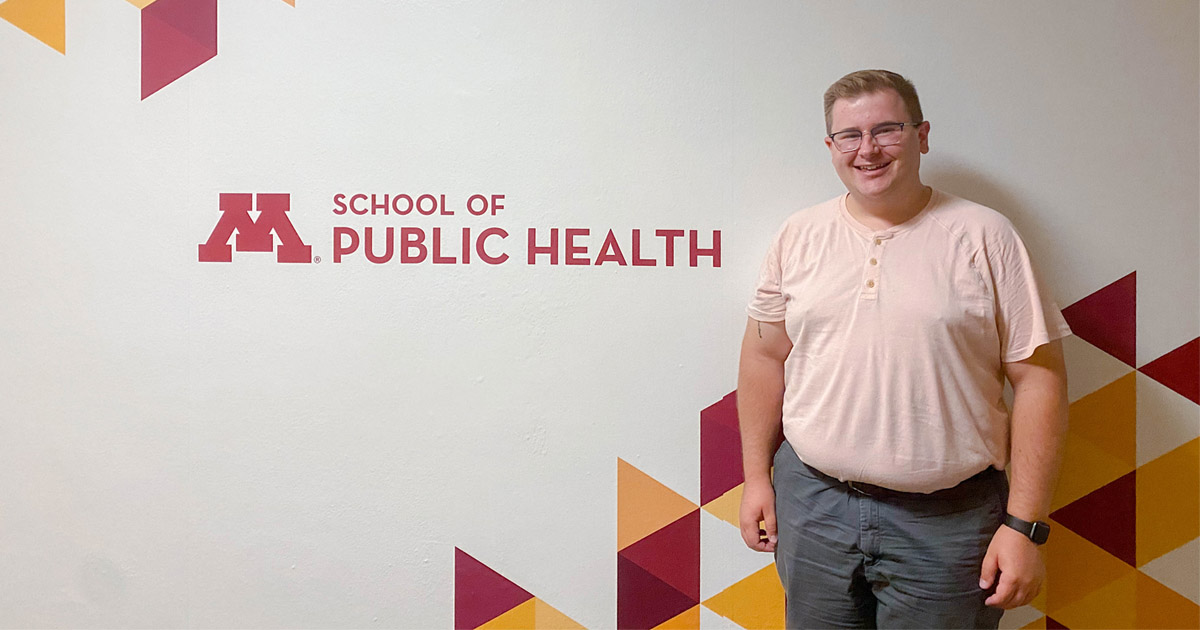"In the U.S., a lot more money is spent on administrative costs than on the people in need. I realized my passion for helping people would best be expressed through policymaking. I want to make a change in how money is spent on healthcare, and that’s more impactful at the policy level."
First, I’d like to know a little bit about you as a person. Where did you grow up? Where did you attend undergrad and what was your degree/area of study? (Bob) I grew up in the small rural town of Two Harbors in northeastern Minnesota. I graduated with a class of about 80 other students. The entire junior high and high school combined was only about 600 people. In Two Harbors, we only had one primary care clinic and a very limited hospital. For my undergraduate degree, I received a Healthcare Management bachelor’s degree from the University of Minnesota Duluth. While there, I learned a lot from Professor Jennifer Schultz, who was also a state legislator at the time, and I understood very quickly that making hospitals money wasn’t an interest of mine but that changing health policy was.
What drew you to public health? (Bob) While in undergrad, I took a variety of management-focused healthcare classes like healthcare finance and healthcare quality. During a research project I did with Professor Schultz, I learned how much hospitals weren’t spending on community benefits (as required in the ACA), but rather was spent in ways that do not benefit the community. I thought that was wrong, and it really shifted things for me. I no longer wanted to run a hospital. I realized I could better help address health inequities by creating policies rather than trying to optimize a single hospital or healthcare system.
What specific issue, problem, or area of research in public health do you care the most about and  why? (Bob) In the U.S., a lot more money is spent on administrative costs than on the people in need. I realized my passion for helping people would best be expressed through policymaking. I want to make a change in how money is spent on healthcare, and that’s more impactful at the policy level. Also, remedies for health disparities are more effective for populations if they happen in the form of policy.
why? (Bob) In the U.S., a lot more money is spent on administrative costs than on the people in need. I realized my passion for helping people would best be expressed through policymaking. I want to make a change in how money is spent on healthcare, and that’s more impactful at the policy level. Also, remedies for health disparities are more effective for populations if they happen in the form of policy.
In terms of population groups, I’m always finding myself searching for ways to improve the lives of rural and queer folks. Recently, there was a grant at the SPH Rural Health Research Center that I was able to help with. I’d love to work at the state or federal level doing some type of health policy work or advocacy work focused around rural and queer health.
How would you like to help address or explore this issue? (Bob) When I first started as a research assistant with the Rural Health Research Center, I was assigned to a case study series to figure out the positive things going on in rural America with queer folks. We did a research project on Pride organizations and events happening across rural America, including central Minnesota. Now, in my own research, I’ve zeroed more in on rural transgender folks, which has been difficult because there is very little academic literature available on that population. This makes improvements difficult because when advocacy groups are trying to help, it’s being done without data, and it usually doesn’t work.
You’ve done some health equity work as well, right?
(Bob) Yes, I did my Applied Practice Experience (APEX) at the Public Health Law Center where I focused on improving racial health equity by building a toolkit around the ‘racism is a public health crisis’ declarations and emergencies made by states. The toolkit is made up of shorter briefs on how structural racism appears in the social determinants of health.
Why did you choose to come to the U of M School of Public Health?
(Bob) I always wanted to attend the University of Minnesota. I had applied for undergrad but was denied. But, I had made a lot of connections from going to UMD and so for grad school I only applied to the University of Minnesota School of Public Health. My plan was that if I didn’t get in by the deadline, then I would apply to the other grad schools on my list. Thankfully, I did get in!
What are the reasons why you chose your program? What do you like about it?
(Bob) I knew I wanted to do policy work so pursuing a Public Health Administration & Policy MPH just made sense. The combination of learning administrative and policy skills in one program was also really appealing to me. The programs I saw offered by other schools were kind of one or the other. Lastly, the faculty members in my program at the U of M are doing really great work here in Minnesota – Professor Katy Kozhimannil and Associate Professor Sarah Gollust are doing really important work in the health policy space and I wanted to learn from them.
What has been your favorite class so far? (Bob) Principles of Health Policy (PubH 6735) with Professor Katy Kozhimannil. I love this course so much. Even now that I’m a teaching assistant for the course, I’m still learning new things with every lecture.
In what ways is the school a good fit for you? (Bob) I think SPH has done a great job of creating and fostering a community. I was worried about not being close with my cohort and making friends since we were all coming off the social awkwardness of the pandemic. I think we were all a little nervous at the beginning, but we were all so eager to finally be social that it actually made things really easy.
What do you like about being in Minnesota? (Bob) I kind of like the cold, despite what I’ll be saying in February. We have all four seasons, we have the always perfect conversation starter of the ever-changing weather. But the #1 thing I love about Minnesota is the lakes. Since I was little, I’ve always lived close to lakes and that’s something I love about living in the ‘Land of 10,000 Lakes.’

